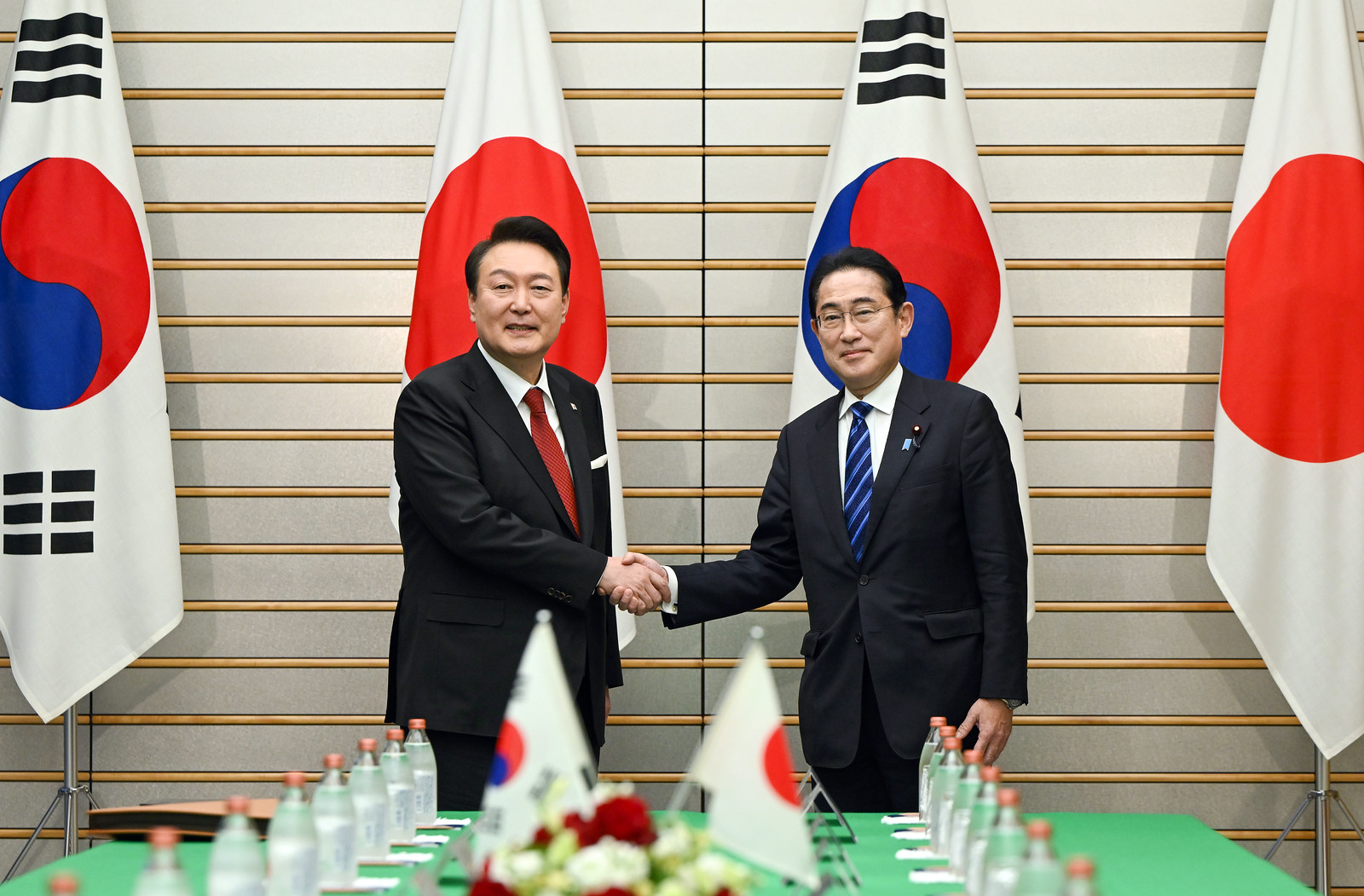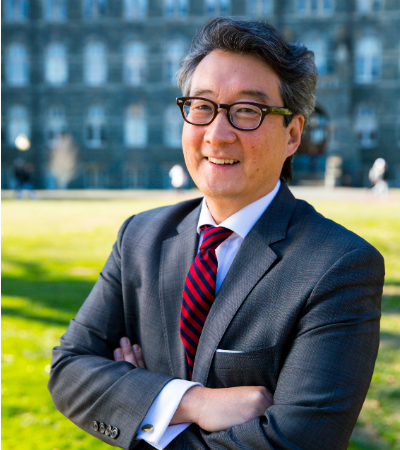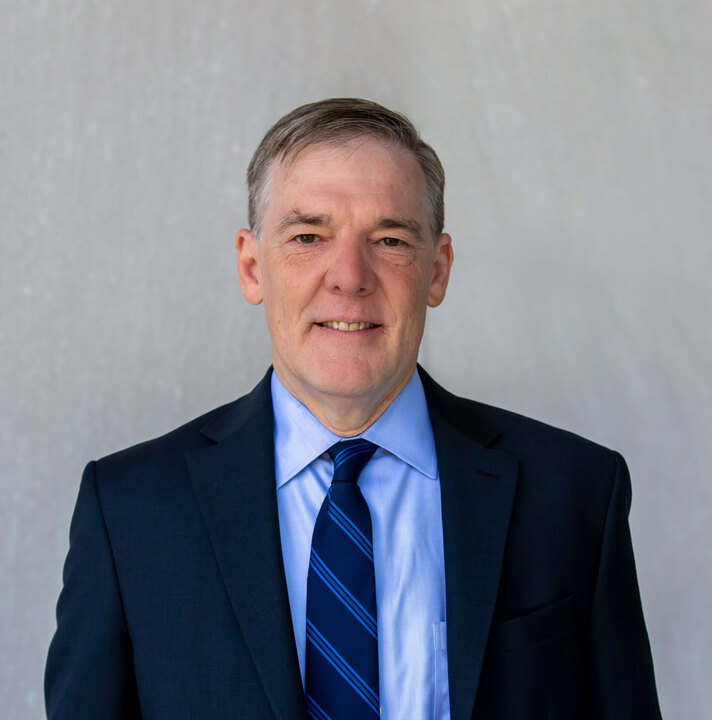The Rising Tide of Japan-South Korea Relations
The Japanese prime minister’s recent visit to Seoul signals a long-awaited sea change.

Published by The Lawfare Institute
in Cooperation With

Japanese Prime Minister Kishida Fumio’s visit to Seoul this week affirms the new reality in ties between Japan and South Korea: that a rising tide of common strategic interests is submerging the issues of history that have long divided them. This is a welcome change that is clearly in U.S. interests, and one that could prove to be enduring in the current strategic environment—if it doesn’t fall prey to parochial domestic exigencies. The United States should have a light touch in mediating this delicate historical rapprochement between its two key allies in Asia, while focusing on practical ways the three can cooperate going forward.
Kishida’s trip, the first bilateral visit by a Japanese prime minister in 12 years, was light on deliverables but long on sentiment and signaling. Kishida brought with him expected notice that Japan has begun the formal process of restoring South Korea to Japan’s “Group A” export control list, from which it was removed in 2019 during a tit-for-tat series of actions taken as relations deteriorated—but little else in terms of concrete actions. But more than he did during South Korean President Yoon Suk Yeol’s visit to Tokyo, Kishida clearly signaled that he shares Yoon’s commitment to building a bilateral partnership—a welcome shift from the cautious embrace that characterized Tokyo’s early response to Yoon’s overtures.
The trip had an auspicious start, as Yoon rolled out the red carpet for Kishida in Seoul on his arrival. In a gesture of hospitality, the South Korean president hosted an intimate dinner with spouses at their residence. Yoon spoke of his forward-looking vision for relations with Japan and showed appreciation for the visiting prime minister’s paying respects at the National Cemetery in Seoul to fallen independence activists. Kishida for the first time also agreed to receive a Korean delegation for consultations on the release of treated waste water from the Fukushima nuclear plant, a longstanding irritant between the two countries.
In the press conference that followed their two-hour meeting, the two leaders expressed mutual commitments to see the rapprochement through to the end. Yoon spoke of his personal responsibility in improving bilateral ties, and Kishida reiterated his respect for Yoon’s “decisiveness and initiative” to improve the relationship, and said that he had decided to accelerate the timing for his visit, which was originally planned for later in the summer. Kishida added a personal touch in addressing the fraught issues related to the colonial period, expressing profound “heartache” for “the many people who experienced suffering and sadness in severe circumstances.” At the end of his remarks in the press conference, Kishida said that at the G-7 Summit in Hiroshima, he and Yoon would together visit a memorial to Koreans killed in the atomic bombing—a significant gesture, given that the more than 20,000 Korean victims were largely forced laborers brought to Japan during the colonial period.
More significant was the long list of areas the leaders identified where their two governments continue to deepen cooperation. Yoon and Kishida pointed to the launch of a bilateral dialogue on economic security, including cooperation on supply chains; the resumption of finance minister meetings and bilateral security talks, each for the first time in five years; and significant engagement with the United States, including plans for another meeting with President Joe Biden on the margins of the G7. It is this extensive common agenda—grounded in mutual interests, concerns about China’s role in the international order, and a deteriorating global security environment—that could help to ensure that the shift in bilateral ties is durable.
But the waters ahead may not remain calm. Some on the progressive left in Korea and parts of the political right in Japan have been critical of this rapprochement. The former accuses Yoon of “humiliating” diplomacy before its past colonial aggressor, while the latter criticizes Kishida for setting his country up for another disappointment when future elections in Korea may return an anti-Japan politician to the presidency. These dynamics leave both politicians with little room to maneuver, and each has consumed large amounts of political capital for the sake of diplomacy. While some domestic critics denigrate Yoon and Kishida for lacking acute political antennae, the authors of this piece believe they are demonstrating the leadership and foresight necessary in these challenging times—and that they are seizing the opportunity presented by the growing strategic alignment between the two countries.
The White House has supported this rapprochement indirectly, through a regular drumbeat of trilateral meetings over the last year. It should continue to do so, while refraining from direct involvement in historical issues; one key to the durability of this reconciliation will be the sense on both sides that progress has been driven by the parties themselves, and that ultimate accountability rests in Tokyo and Seoul. On this score, the political timing of the breakthrough in Japan-South Korea ties should help to reinforce its longevity. Yoon has nearly four years left in his term. Kishida is likely to call an election later this year, but his approval ratings have recovered significantly since last year when his cabinet was dogged by scandal and his standing as the leader of his party, the Liberal Democratic Party, appears secure. The relatively long runway ahead for both leaders creates the opportunity to cement the new dynamic in bilateral ties.
Washington can best help by lashing up with its allies wherever possible, and by institutionalizing the areas of cooperation that are deepening. The three governments should regularize the trilateral dialogue on economic security that began in February, among senior officials in respective national security councils. They should convene a ministerial economic “2+2+2” meeting, to further drive the common agenda in these areas. They should take steps to formalize deeper defense ties, including by establishing liaison officers at Combined Forces Command and at U.S. Forces-Japan at Yokota Air Base, and by exchanging observers at respective bilateral exercises; the three governments should establish a trilateral military planning cell to facilitate coordination during a crisis on the Korean Peninsula. And they should launch periodic trilateral discussions on extended deterrence, to complement the new bilateral Nuclear Consultative Group announced during Yoon’s visit to Washington.
The detritus of history will never completely disappear in the relationship between Tokyo and Seoul. Kishida’s remarks at the press conference fell short of a fresh apology, and many in South Korea will no doubt find them unsatisfactory. Issues related to territorial disputes, textbooks, and other irritants will no doubt periodically reappear above the surface. But the rising tide of common strategic interests, reinforced by leadership in both capitals and support from Washington, may finally subsume the tragedies of the past.






